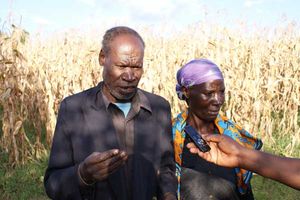
Iranian Sayed Mansour Mousavi (L) and Ahmad Abolfathi Mohammed after being sentenced to life in prison on terror-related charges, including the possession of explosives allegedly for use in bomb attacks, on May 6, 2013. PHOTO/FILE
In May 2013, Iranian nationals Ahmad Mohammed and Sayed Mousavi were sentenced to life imprisonment after they were linked to terror-related activities in the country.
However, following an appeal, the term was reduced to 15 years.
Shortly after, Mohammed and Mousavi successfully applied for early pardons and walked out of Kamiti Maximum Prison in September 2022.
Their release faced protests from the public, but the State maintained that the early pardon system had run its course and set the duo free.
The series of events triggered debate on whether terror convicts should also be eligible for pardon under the Power of Mercy Committee.
The Power of Mercy Committee is a constitutional body tasked with releasing well-behaved prisoners nearing the end of their term, and whose release is likely to add value to the society while decongesting Kenya’s correctional facilities.
Mohammed and Mousavi were arrested in June 2012 and charged with being in possession of 15kg of Research Department Explosive (RDX).
It is also known as Royal Demolition Explosive and is an organic compound widely used as an explosive. It is white, odourless and tasteless.
High Court judge Kiarie Waweru, while sentencing Mohammed and Mousavi to life imprisonment, said he could not ponder the damage that the planned terror attack would have caused.
He added that the cry of victims of previous terror attacks is louder than the pleas Mohammed and Mousavi made as they sought leniency.
Days after Justice Waweru’s judgment, Israeli Prime Minister Benjamin Netanyahu claimed that Iran was plotting attacks against Israel and that the target was Kenya. This was dismissed by the Iranian Government.
The two suspects, through their legal team, then filed their appeal.
After the appeal, their freedom was short-lived as they were re-arrested following an application by the Director of Public Prosecution (DPP), who moved to the Supreme Court seeking reinstatement of the life sentence. The Supreme Court instead jailed them for 15 years.
In their ruling, Justices David Maraga (now retired), Jackton Ojwang’ and Njoki Ndung’u ruled that circumstantial evidence had placed the two at the scene where the deadly explosives were discovered.
"The circumstantial evidence on record points to the respondents as the people who planted the explosive at the scene where it was dug out. There's no evidence of anyone else having previously planted anything in Mombasa Golf Course and, particularly, in the vicinity of hole number nine," the judges noted in their ruling made in March 2019.
During their time in prison, there was a failed attempt to break Mohammed and Mousavi out.
Shortly after, two Iranians who entered Kenya just before the escape attempt were arrested for being in the country illegally, as Iran recalled its Ambassador to Kenya, Hadi Farajvand.
Mohammed and Mousavi are among several terror convicts who have had their sentences reduced on appeal, with prosecutors being faulted for not presenting watertight cases with enough evidence to sustain harsher punishments.
Joseph Mutuku Muinde's jail-term reduced from five years to 12 months
In another case, Joseph Mutuku Muinde, a self-confessed terrorist was on January 17, 2017, convicted for making a false statement to the effect that he was a member of al-Shabaab and had been hired to attack at the extremist group’s behest.
He pleaded guilty to the offence and the Chief Magistrate’s Court found him guilty before sentencing Muinde to 5 years in prison.
However, Muinde moved to the High Court, where he claimed to have been drunk when confessing. He also argued that the sentence was too harsh.
Judge Farah S.M. Amin found that while the offence was serious, the five-year sentence was excessive.
The Judge ordered that the sentence be reduced to 12 months, which Muinde had already served during the pendency of the proceedings in the two courts.
Justice Amin ordered Muinde to community service, particularly cleaning and maintenance duties, at Voi police station. He was required to do the service every Tuesday and Thursday for six months.
Isaac Lekushon Taruru jail term reduced from 10 years to 5 years
Just like Muinde’s case, Isaac Lekushon Taruru confessed to being a member of al-Shabaab and claimed he had received training in Mombasa County.
Court documents reveal that he was arrested on October 27, 2014, following information that was given to the police by National Intelligence Service (NIS) officers. The tip-off stated that there al-Shabaab operatives in Narok County.
Taruru then told the arresting officers that he and others had been recruited by some Somali men, who trained them in a Mombasa mosque.
Taruru added that he was willing to identify the other trainees.
However, when he was taken to the Anti-Terrorism Police Unit (ATPU) in Nairobi, he denied being a member of al-Shabaab.
Police officers took Taruru for an assessment at the Mathare Teaching and Referral Hospital. He was found fit to stand trial.
He was charged with giving false information, contrary to section 20 of the Prevention of Terrorism Act.
Taruru pleaded guilty and was sentenced to 10 years in prison. He appealed against the sentence.
The Court of Appeal found the sentence imposed was excessive on account of the guilty plea, coupled with the fact that he was a first-time offender.
The sentence was reduced to 5 years’ imprisonment.
Julius Yohana Mbunguni jail term reduced from 10 years six months to six months
Julius Yohana Mbunguni, a Tanzanian national, was arrested on February 12, 2016, as he was heading to Somalia. He was arrested in Garissa County.
He did not have travel documents and could not explain what he was going to do in Somalia.
He was charged with two counts; travelling to a terrorist-designated country contrary to section 30C (1) of the Prevention of Terrorism Act (2012), and being unlawfully present in Kenya contrary to section 53 (1) and (2) of the Kenya Citizenship and Immigration Act (2011).
He pleaded guilty to both counts and was sentenced to a 10-year imprisonment term for the first count, and 6 months for the second.
Mbunguni was to be deported to Tanzania at the end of the prison term.
He challenged the decision at the Court of Appeal, which upheld the conviction and sentence for being in Kenya illegally.
But on travelling to a terrorist designated country, the Court of Appeal held that Mbuguni’s charge sheet did not indicate that Somalia had been declared, by the Interior CS, to be a terrorist-designated training country.
The suspect had been charged under an order by the Interior Ministry which states that “a person who travels to a country designated by the Cabinet Secretary to be a terrorist training country without passing through designated immigration entry or exit point shall be presumed to have travelled to that country to receive training in terrorism.”
In addition, the charge sheet did not disclose when and how the Cabinet Secretary made the declaration.
The judges ruled that Mbuguni pleaded guilty and was convicted for a non-existent offence, and struck out the 10-year sentence handed to the Tanzanian.
Richard Baraza Wakachala jail term reduced from 10 years to Zero

Richard Baraza Wakachala leaves the Mandera Law Courts to start his 10-year prison sentence at the Mandera GK Prison. He pleaded guilty to charges of traveling to a terrorist-designated country with the intention of joining Al-Shabaab and failing to seek a valid travel permit into Somalia.
Richard Baraza Wakachala was set free after the High Court held that there was no evidence to show that Somalia is designated as a terrorist training country.
Wakachala was arrested on October 27, 2015, arrested after security agencies discovered that he travelled to Somalia.
He was arrested in Mandera Township.
Prosecutors argued that Wakachala did not inform any immigration officer of his intended travel to Somalia, as required by the Kenya Citizenship and Immigration Act.
At the Magistrate Court in Mandera he pleaded guilty to travelling to a terrorist-designated country without passing through a designated exit point contrary to the Prevention of Terrorism Act (2012), and failure to report departure as per the Kenya Citizenship and Immigration Act (2011).
Wakachala informed the court that his intentions were to “join al-Shabaab and be killed by them.”
He was jailed for 10 years after being found guilty of travelling to a terrorist-designated country.
However, the High Court stated that the charge sheet did not specify that Somalia had been declared a terrorist-designated country and that the declaration was not backed by any law.
On those two grounds, the judge quashed the conviction and set aside the 10-year imprisonment sentence.
At least six other people have been set free and had their prison sentences quashed on account of that non-existent declaration of Somalia as a terrorist-designated country.
Ibrahim Adan Abdirahman jail-term reduced from 11 years to just one year
Somali national Ibrahim Adan Abdirahman is a Somali national was arrested on October 10, 2015, after being found with a drawing of an Improvised Explosive Device (IED).
He was charged with being in possession of an article for the use in instigating the commission of a terrorist act contrary to section 30 of the Prevention of Terrorism Act, 2012.
He was also charged with being unlawfully present in Kenya, contrary to section 53 (1) (j) as read with section 53 (2) of the Kenya Citizenship and Immigration Act, 2011.
Abdirahman pleaded guilty to being in the country illegally and was ordered to pay a fine of Sh50,000 and serve a one-year prison sentence.
However, he pleaded not guilty to being in possession of an article for the use in instigating the commission of a terrorist and the judge ordered that he be jailed for 10 years.
Abdirahman challenged the sentence at the High Court, which found that the charge sheet was defective.
The judge dismissed the 10-year prison term and ordered that Abdirahman be released and repatriated to Somalia, as he had already served the sentence for being in the country illegally.










